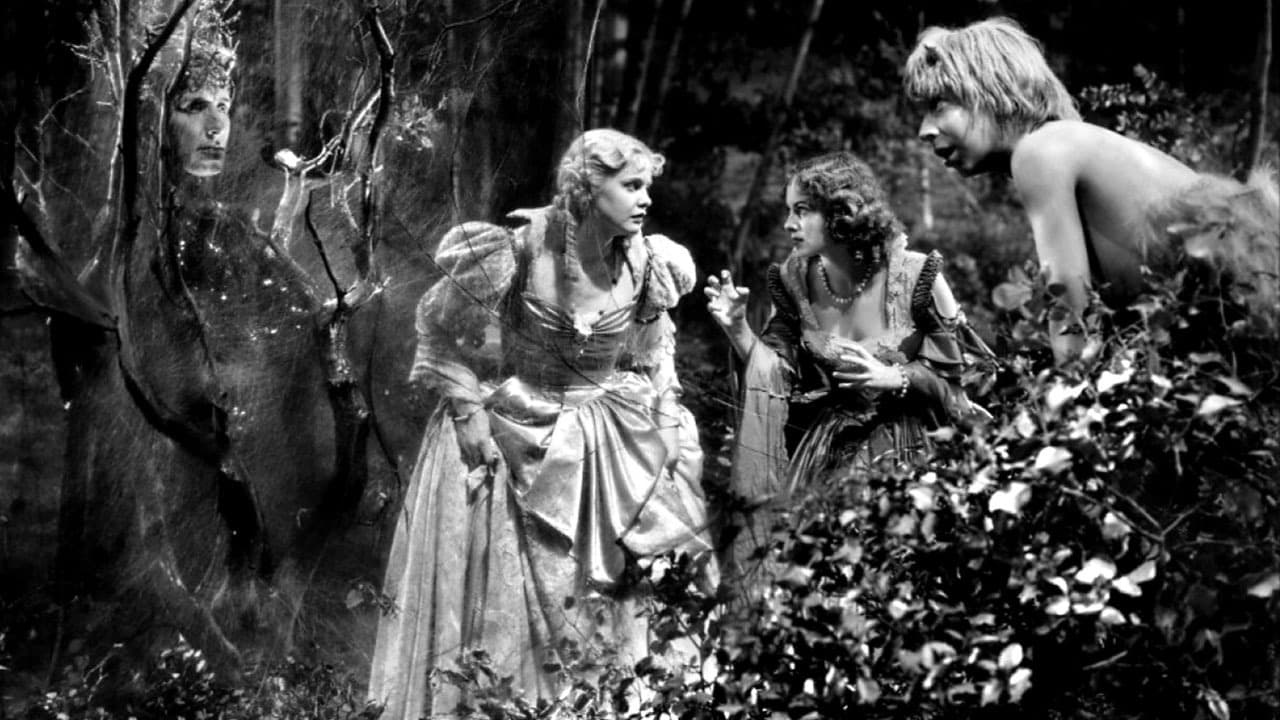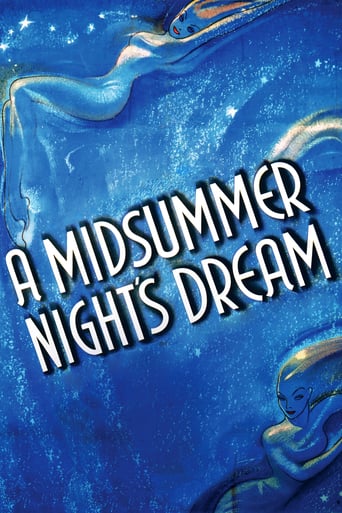Boobirt
Stylish but barely mediocre overall
CommentsXp
Best movie ever!
Nessieldwi
Very interesting film. Was caught on the premise when seeing the trailer but unsure as to what the outcome would be for the showing. As it turns out, it was a very good film.
Helloturia
I have absolutely never seen anything like this movie before. You have to see this movie.
charlesem
The spirit that animates this version of the play is not that of William Shakespeare but Felix Mendelssohn. Shakespeare's text has been trimmed to a nubbin and hashed up by the "arrangers," Charles Kenyon and Mary C. McCall Jr., and it's gabbled by the all-star cast. Strangely, Olivia de Havilland as Hermia and Mickey Rooney as Puck are the worst offenders, and they are the only members of the cast of Max Reinhardt's celebrated 1934 Hollywood Bowl production, which inspired Warner Bros. to film the play, who made it into the movie. De Havilland delivers her lines with heavy emphasis on seemingly random words and with odd pauses, while Rooney punctuates every line with giggles, chortles, and shrieks that affect some viewers like fingernails on a chalkboard. Nobody in the cast seems to be aware that they're speaking verse. Fortunately, the decision was made to use the Mendelssohn overture and incidental music (along with snippets of other works by Mendelssohn), and to have it orchestrated by Erich Wolfgang Korngold. The result is an opulently balletic version of the play, taking advantage of what can be done in movies that can't be done on stage. Is it good? Maybe not, but it's much more fun than the stodgily reverent version of Romeo and Juliet (George Cukor, 1936) that MGM came up with the following year. Casting James Cagney as Bottom/Pyramus and Joe E. Brown as Flute/Thisby was a masterstroke, and if they had been directed by someone with a surer sense of American comic idiom than Reinhardt, the Viennese refugee from Hitler who spoke very little English (Dieterle acted as interpreter), the results would have been classic -- as it is, they're just bumptious fun. Much of the movie is sheer camp, reminiscent of the twee illustrations for children's books in the early 20th century. But there is a spectacular moment in the film when Oberon (Victor Jory) gathers the fairies, gnomes, and bat- winged sprites to depart, under a billowing black train that sometimes resembles smoke. The cinematography by Hal Mohr won the only write-in Oscar ever granted by the Academy. (charlesmatthews.blogspot.com)
SimonJack
All playwrights are confined to the physical restrictions of the stage to bring their works to life. But, surely, in dreaming up their stories, their imaginations are not so constricted. If William Shakespeare had lived to see this movie in 1935, I think he would have said that Max Reinhardt had captured "A Midsummer Night's Dream" on film – just as he had imagined it when penning the play in the 16th century. Indeed, the technical and production achievements in this film -- from the early years of talking movies, are so great that no one has ever made another movie of the story to rival it. And, there have been more than 40 silver screen and TV productions of "A Midsummer Night's Dream" as of the early 21st century. Shakespeare's comedy fable of romance, love, mythology and early stage life comes alive in this film with lavish sets, marvelous costumes, outstanding special effects and superb cinematography, direction, and editing. Of course, this is to take nothing away from a stellar cast that included some of the best actors and up-and-coming performers of the day. The film won two Oscars, for cinematography and best film editing. It was nominated for best picture and best assistant director. Mickey Rooney is fantastic as Puck, the fairy servant to Oberon. Rooney was just 15 when the movie came out, and had been a child actor since age six – appearing in nearly 100 film shorts and pictures before this time. This was the third film of Olivia de Havilland's debut year in Hollywood, and her portrayal of Hermia put her on the road to star status. Bigger name stars of the time gave superb performances. Dick Powell plays Lysander, James Cagney is Bottom, Joe E. Brown is Flute, Victor Jory is Oberon, Ian Hunter is Theseus, Jean Muir is Helena, Grant Mitchell is Egeus, Anita Louise is Titania, and Frank McHugh is Quince. The quality and technical achievements in this film were so great that it was many years before anyone even tried it again, beyond the stage. The first TV movie rendition came 24 years later -- in 1959, and the next silver screen rendition came out in 1968 – 33 years after this films. This 1935 film is the benchmark for Shakespeare's great comedy on the silver screen. It's one that's not likely ever to be equaled or bettered. The bard's comedy is there in any good stage production, but this film adds the wonderment of fantasy. The audience sees the spectacle in the sky with fairies that fly. And nowhere is there a wire to be seen or a support revealed. It's as much fun watching this film for the technical and "magical" aspects as for the story itself.The 2007 Warner Brothers DVD of this film has a "Vintage Featurette" short that IMDb doesn't have in its vast array of all things film and video. "A Dream Comes True – The Making of a Classical Motion Picture" is a Vitaphone short of 1935 that runs seven minutes. It has scenes of celebs attending the Hollywood premiere of "A Midsummer Night's Dream," and background on the making of the movie. To build the giant forest on a huge sound stage, studio technicians roamed the countryside for trees of unusual shapes. They added waterfalls and rivulets for reality, and brought in birds and animals. The short runs through the casting selection of 20 prominent actors cast in lead roles. Rex Reinhardt, the renowned stage producer and director had put the play on in the Hollywood Bowl the year before. It was a huge success, and Warner Brothers signed him to produce and direct the movie. Reinhardt brought Wolfgang Korngold from Vienna to arrange the music by Felix Mendelssohn for the film. The electricity for the lighting needed to illuminate the huge forest and set was enough to run a small city. It created a great deal of heat on the set, and the cast "melted" under their heavy costumes. The short shows performers cooling off in front of a giant fan, while Dick Powell treats the children fairies to double-scoop ice cream cones.
dougdoepke
It's a maddening movie, hard to get a handle on. On one hand, there's the Anglo world's leading playwrite, Shakespeare, along with the glorious strains of Mendelsohn; on another, there're a bunch of Hollywood contract players who made their bones as gangsters or low comedy relief. Add a wild card of downright ethereal imagination, and you've got a movie like no other. I can see why the two hours and more failed at the box-office. After all, how many movie-goers want Shakespeare with their gun-toting Cagney, even if he does well. Then too, two hours of poetic dialog, along with goofy mugging, can strain more than just the backside. Frankly, I fast-forwarded through some of the mugging passages. But what kept me going were those ethereal passages, especially the early ones. Now ordinarily, I'm not too much on fairies, nymphs or wood sprites. But the sight of those wispy creatures snaking up beams of light and into some nether world is darn near as good as Randolph Scott striding down a lawless street. In fact, it may be even better, certainly more exotic. Whoever staged those unearthly scenes deserves an Oscar of superlative design. Anyhow, I'm in no position to really judge the film since I wouldn't know Shakespeare from Albert Einstein. But I do know that visual imagination doesn't come anymore striking. And if the beams preview a stairway to the Pearly Gates, then count me in, even if I have to put down my beer bottle.
alien1011
An early film adaptation of Shakespeare and it's aged pretty well. There are some obvious moments where modern film-making would have improved things, especially the lighting. The long version is really long, with the ethereal fairies moving about in a way that added nothing to the film.As for the acting, my primary negative takeaway is with Puck. Mickey Rooney played the sprite, and over acted it entirely. At the start, it was mildly charming. With every scene it was made worse with his voice and his laugh. I came to dread every scene in which Puck was in. It wasn't helped by the lovers being uninteresting as well. There wasn't much chemistry between them and Lysander also had an unfortunate laugh.The film was saved, by two things. One, it's Shakespeare. The plot and dialogue are solid and it was a fine adaptation. The best part of the movie, were the players. Joe E. Brown's comic relief was great. The last scene of the movie featured him and it leaves one with a great feeling of the movie.The surprising, was James Cagney as Bottom. His part was perfectly played as an over-acted role and he was clearly having fun doing it. He was deserving of an Academy Award nomination, as it really was one of the best of his career. To anyone thinking of him as just a hard nosed gangster, he had some great range.It was truly a joy to watch Cagney, and I almost wonder how he would have handled the Puck role. It couldn't have made things worse than Mickey Rooney already did. Watch this movie because it's Shakespeare and James Cagney. Just try not to let Mickey Rooney force you to stop before the end.

